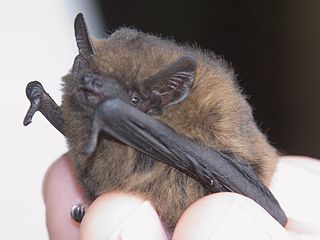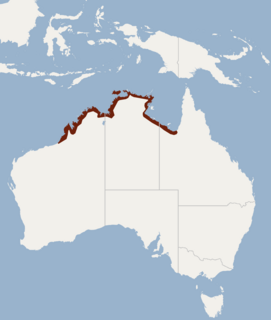
Pipistrellus is a genus of bats in the family Vespertilionidae and subfamily Vespertilioninae. The name of the genus is derived from the Italian word pipistrello, meaning "bat".

The common pipistrelle is a small pipistrelle microbat whose very large range extends across most of Europe, North Africa, South Asia, and may extend into Korea. It is one of the most common bat species in the British Isles. In Europe, the northernmost confirmed records are from southern Finland near 60°N.

The Japanese house bat or Japanese pipistrelle is a species of vesper bat. An adult has a body length of 3.6–4.8 cm (1.4–1.9 in), a tail of 2.9–4.0 cm (1.1–1.6 in), and a wing length of 3.2–3.6 cm (1.3–1.4 in). It prefers to roost under the ceiling or inside the roof of old buildings. It is found across East Asia, from China and Taiwan into the Ussuri region, the Korean Peninsula, and Japan.

Nathusius' pipistrelle is a small bat in the genus Pipistrellus. It is very similar to the common pipistrelle and has been overlooked in many areas until recently but it is widely distributed across Europe. It was described by two German naturalists, Alexander Keyserling and Johann Heinrich Blasius, and named by them after Hermann von Nathusius, in gratitude for his support of their research.
Sturdee's pipistrelle, also known as the Bonin pipistrelle bat, is a bat that was thought to have lived in Japan before officially becoming extinct in 2000. In 2020 the IUCN changed its official status to "extinct".

Rüppell's bat, also known as Rüppell's pipistrelle, is a species of vesper bat found in Africa and Asian republics such as Iraq and Israel. It is the only member of the genus Vansonia. It is found in dry and moist savanna, subtropical or tropical dry shrubland, and hot deserts.
The angulate pipistrelle, also known as the New Guinea pipistrelle, is a species of vesper bat found in Papua New Guinea and the Solomon Islands.

Endo's pipistrelle is a species of vesper bat that is endemic to Japan. It is found in temperate forests.
Aellen's pipistrelle is a species of vesper bat. It can be found in possibly Benin, Cameroon, Ghana, Nigeria, and Sierra Leone. It is found in dry and moist savanna.

Kuhl's pipistrelle is a species of vesper bat that occurs in large areas of North Africa, Southern Europe and West Asia. It lives in temperate forests, subtropical or tropical dry shrubland, Mediterranean-type shrubby vegetation, temperate grassland, rural gardens, and urban areas. It is a rare and infrequent visitor to Britain, usually only detected by sound-recordings.

The Mount Popa pipistrelle is a species of vesper bat. It is found in China, India, Myanmar, Thailand, and Vietnam.
The Dar es Salaam pipistrelle is a species of vesper bat. It is found only in Tanzania. Its natural habitat is subtropical or tropical dry forests.

The least pipistrelle is a species of vesper bat.

The northern pipistrelle, also known as Koopman's or the mangrove pipistrelle, is a species of vesper bat found only in Australia. It is one of Australia's smallest bat species. On average, it weighs 3 g (0.11 oz).

Anchieta's serotine, formerly known as Anchieta's pipistrelle, is a species of vesper bat. It is found in Angola, Democratic Republic of the Congo, South Africa, Zambia, Zimbabwe and Madagascar. The species inhabits savanna habitats.

The dusky pipistrelle is a small pipistrelle bat found in Africa.

Pipistrellus raceyi, also known as Racey's pipistrelle, is a bat from Madagascar, in the genus Pipistrellus. Although unidentified species of Pipistrellus had been previously reported from Madagascar since the 1990s, P. raceyi was not formally named until 2006. It is apparently most closely related to the Asian species P. endoi, P. paterculus, and P. abramus, and its ancestors probably reached Madagascar from Asia. P. raceyi has been recorded at four sites, two in the eastern and two in the western lowlands. In the east, it is found in open areas and has been found roosting in a building; in the west it occurs in dry forest. Because of uncertainties about its ecology, it is listed as "Data Deficient" on the IUCN Red List.
Hanak's dwarf bat or Hanak's pipistrelle is a species of bat only found in Cyrenaica, Libya and Crete, Greece.
Neoromicia grandidieri, known by the common names of Dobson's pipistrelle and yellow pipistrelle, is a species of vesper bat found in Africa. It was formerly in the genus Pipistrellus

Pipistrellini is a tribe of bats in the family Vespertilionidae. It contains several genera found throughout the Old World and Australasia, including the pipistrelles, noctules and related species.














